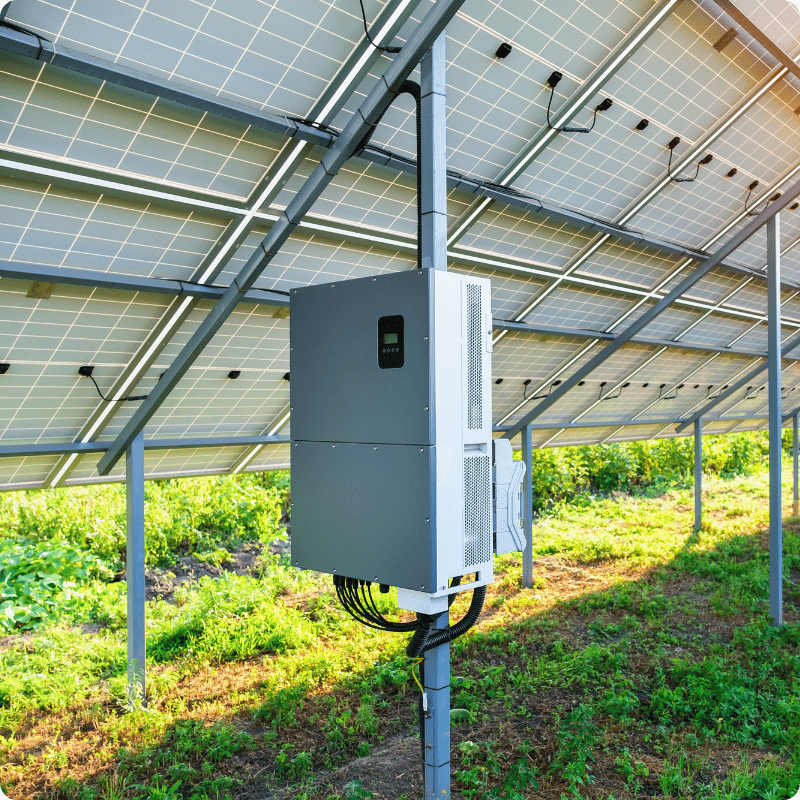China Energy’s solar inverters ensure maximum energy yield from your solar panels, offering superior performance, durability, and seamless integration with various solar power systems.
China Energy’s solar inverters are engineered to deliver superior energy conversion efficiency and reliability, ensuring that you get the most out of your solar power system. Our inverters are designed with advanced technologies to optimize the performance of your solar panels, converting the direct current (DC) generated by the panels into alternating current (AC) that can be used in your home, business, or industrial facility. With robust build quality and intelligent features, our solar inverters provide seamless integration, enhanced durability, and maximum energy yield, making them an essential component of any solar energy system.
This chart compares the efficiency ranges of different inverter types used in solar energy systems, highlighting the performance capabilities of string inverters, microinverters, central inverters, and hybrid inverters.
This chart compares the efficiency ranges of different inverter types used in solar energy systems, highlighting the performance capabilities of string inverters, microinverters, central inverters, and hybrid inverters.
Our solar inverters incorporate the latest advancements in inverter technology, such as high efficiency ratings, advanced MPPT technology, and robust safety features. These features enhance energy conversion, reliability, and overall performance, making our inverters ideal for residential, commercial, and industrial applications.
Advanced Technologies

String inverters are the most common type of inverter used in solar energy systems. They connect a series of solar panels (a string) and convert the DC electricity generated by the panels into AC electricity for use in homes and businesses.
Applications:
Microinverters are installed on each individual solar panel. They convert DC to AC electricity directly at the panel level, which can increase the efficiency and reliability of the solar energy system.
Applications:
Central inverters are used for large-scale solar installations. They are designed to handle high power outputs and are typically installed in a central location to convert DC electricity from multiple solar panel arrays into AC electricity.
Applications:
Hybrid inverters combine the functions of a traditional solar inverter with a battery inverter. They can manage both the conversion of DC to AC electricity and the charging and discharging of solar batteries, making them ideal for solar-plus-storage systems.
Applications:
A solar inverter is a device that converts the direct current (DC) electricity generated by solar panels into alternating current (AC) electricity, which can be used by your home or business. It is crucial for making the energy produced by solar panels usable in everyday applications.
The main types of solar inverters are string inverters, microinverters, central inverters, and hybrid inverters. Each type has unique characteristics and applications, suitable for different system sizes and configurations.
A string inverter connects a series of solar panels (a string) and converts the DC electricity they produce into AC electricity. It is commonly used in residential and small commercial solar systems.
Microinverters are installed on each individual solar panel, allowing for independent operation and conversion of DC to AC electricity at the panel level. This setup increases the system’s efficiency and reliability, especially in installations with shading issues or complex roof structures.
Central inverters are ideal for large-scale solar installations, such as large commercial systems or utility-scale solar farms. They are designed to handle high power outputs and are typically installed in a central location to manage multiple solar panel arrays.
A hybrid inverter combines the functions of a traditional solar inverter with a battery inverter. It can manage both the conversion of DC to AC electricity and the charging and discharging of solar batteries, making it ideal for solar-plus-storage systems.
Choosing the right inverter depends on your specific needs, such as system size, location, and whether you plan to include battery storage. Consulting with a solar energy professional can help you determine the best type of inverter for your setup and ensure optimal performance and efficiency.